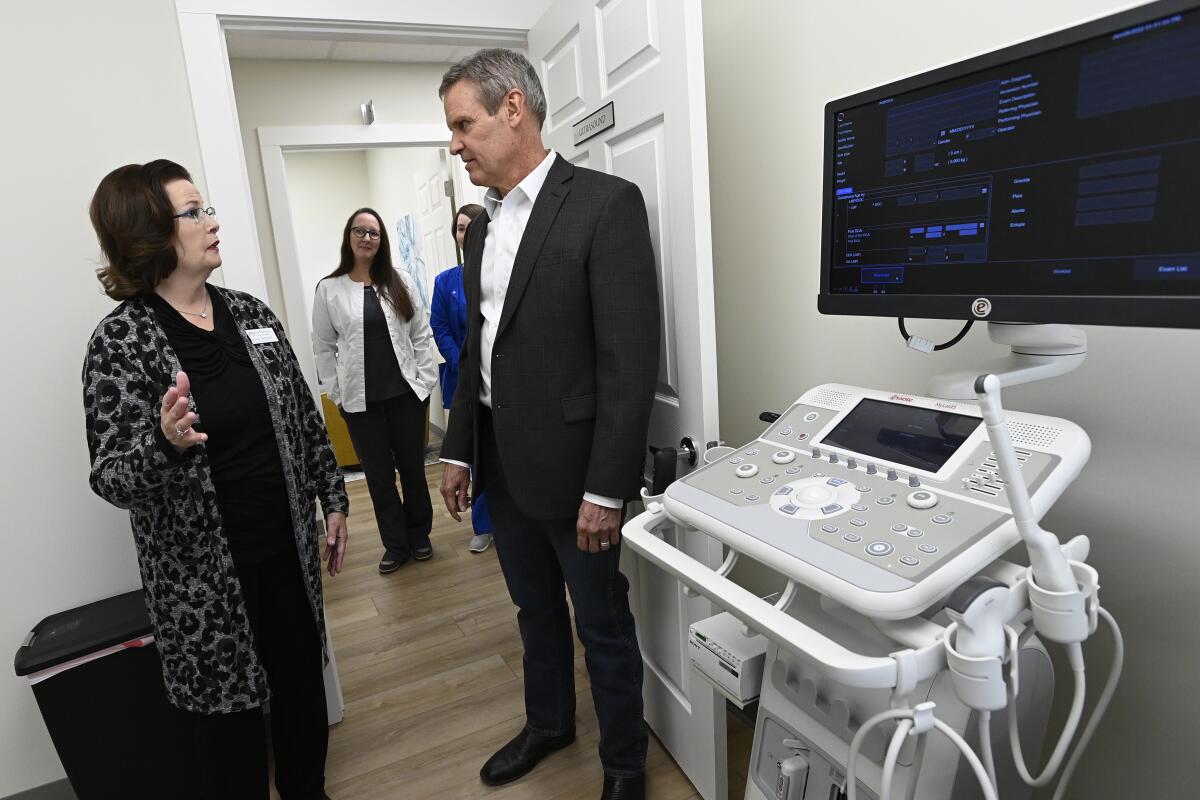Op-Ed: Only states can stop antiabortion ‘crisis pregnancy centers’ from deceiving consumers

- Share via
As we face the imminent overturn of Roe vs. Wade, clinicians, legislators and activists are preparing for dramatic shifts in the lives of pregnant people and their families. One trend that’s already troubling is the proliferation of crisis pregnancy centers, or CPCs, in California and nationwide. These antiabortion organizations target low-income people facing unintended pregnancies. Their goal is not to provide care, but to prevent people from accessing abortion and contraception.
The centers advance their mission “by using deceptive and coercive tactics and medical disinformation, and misleadingly presenting themselves as medical facilities,” according to a recent report from the Alliance: State Advocates for Women’s Rights and Gender Equality. As abortion providers in California, we have witnessed the consequences of this deception and coercion.
Recently a patient came to Dr. Hamilton for a first-trimester abortion. Earlier that day she had undergone an ultrasound at a nearby crisis pregnancy center. She showed Dr. Hamilton an ultrasound image of a 10-week fetus — a picture the center staff had supposedly taken of “her baby.” Upon performing another ultrasound, however, Dr. Hamilton saw in this woman’s uterus a five-week pregnancy: a tiny sac of fluid with a yolk sac (an even tinier white circle) inside it. There was no structure that was recognizable as an embryo. Yet the image that this woman brought from the CPC showed a fetus with a head and trunk and early limb buds.
The center gave this woman a copy of someone else’s ultrasound and told her that it was “her baby.” You can imagine the emotional impact the image made on her — and why the antiabortion organization had an interest in making such an impact. This is ethically outrageous.
We are appalled that states continue to allow this kind of willfully misleading disservice, especially because we know many people will base decisions about their health and their lives on misinformation.
In addition to the egregious example above, we both have seen patients come into our health centers carrying pamphlets from crisis pregnancy centers that falsely link abortion with breast cancer, infertility and depression.
While there remains wide debate in this country about the rights of a pregnant person weighed against the rights of a fetus, it seems irrefutable that every person, pregnant or not, deserves to be given accurate information from anyone who performs a diagnostic exam on their body, such as a pregnancy test or ultrasound. Upon entering a facility that presents itself as a medical or healthcare office, individuals should have a right to receive only facts approved by independent, licensed medical professionals. (Under the Trump administration, clinics that offered abortion information or referrals were barred from receiving Title X funding; surely if that was allowable, states should have the legal authority to crack down on crisis pregnancy centers that dispense deceptive information.)
In a country where maternal mortality has been on the rise for over 20 years, disproportionately among Black, brown and Indigenous people, to deny pregnant people these rights is to deny them their own right to life. It is one of the most egregious examples of reproductive injustice we have ever encountered — and in our work, we have seen plenty.
This month, California Atty. Gen. Rob Bonta issued a consumer alert saying that crisis pregnancy centers in the state “have been reported to make misleading or unsubstantiated claims about abortions to persuade people to continue their pregnancy.” Many centers say they offer “full reproductive services,” but in fact, according to the attorney general’s office, most “do not even offer prenatal care or have a licensed physician on staff.”
While we appreciate the intention behind Bonta’s message, it does not go far enough in emphasizing these antiabortion organizations’ intentional falsehoods and the grievous potential harms.
An estimated 2,500 CPCs are currently active nationwide, more than three times the number of clinics that provide abortions. According to the Associated Press, over the last decade, public funding to CPCs has increased to $89 million a year from $17 million a year. California does not permit state contracts with them, but a California-based private network of crisis pregnancy centers received a grant in 2019 for at least $1.7 million from Title X, the federal program designed to support family planning services for low-income individuals. The Alliance report also found that nine crisis pregnancy centers in California have billed Medi-Cal and received reimbursement from the state for their services.
We agree with the Alliance’s recommendation that any organization or office offering pregnancy-related services, free or at a cost, should be regulated under state consumer protection statutes, just as the government protects the rights of healthcare consumers. Such regulations would protect patient confidentiality and require that consumers receive accurate, easy-to-understand information that honors their right to make decisions about their own health. State legislatures must also act to bar any further government funding from flowing to these organizations.
Low-income pregnant people and their children are a uniquely vulnerable population. With the end of Roe in sight and with crisis pregnancy centers doubling down on their efforts, protecting those individuals is more crucial than ever — but providers like us can’t prevent all the harms of crisis pregnancy centers. Only voters and lawmakers can do that.
Jessica Hamilton is a physician. Christine Henneberg is a physician and the author of the forthcoming book “Boundless: An Abortion Doctor Becomes a Mother.”
More to Read
A cure for the common opinion
Get thought-provoking perspectives with our weekly newsletter.
You may occasionally receive promotional content from the Los Angeles Times.










